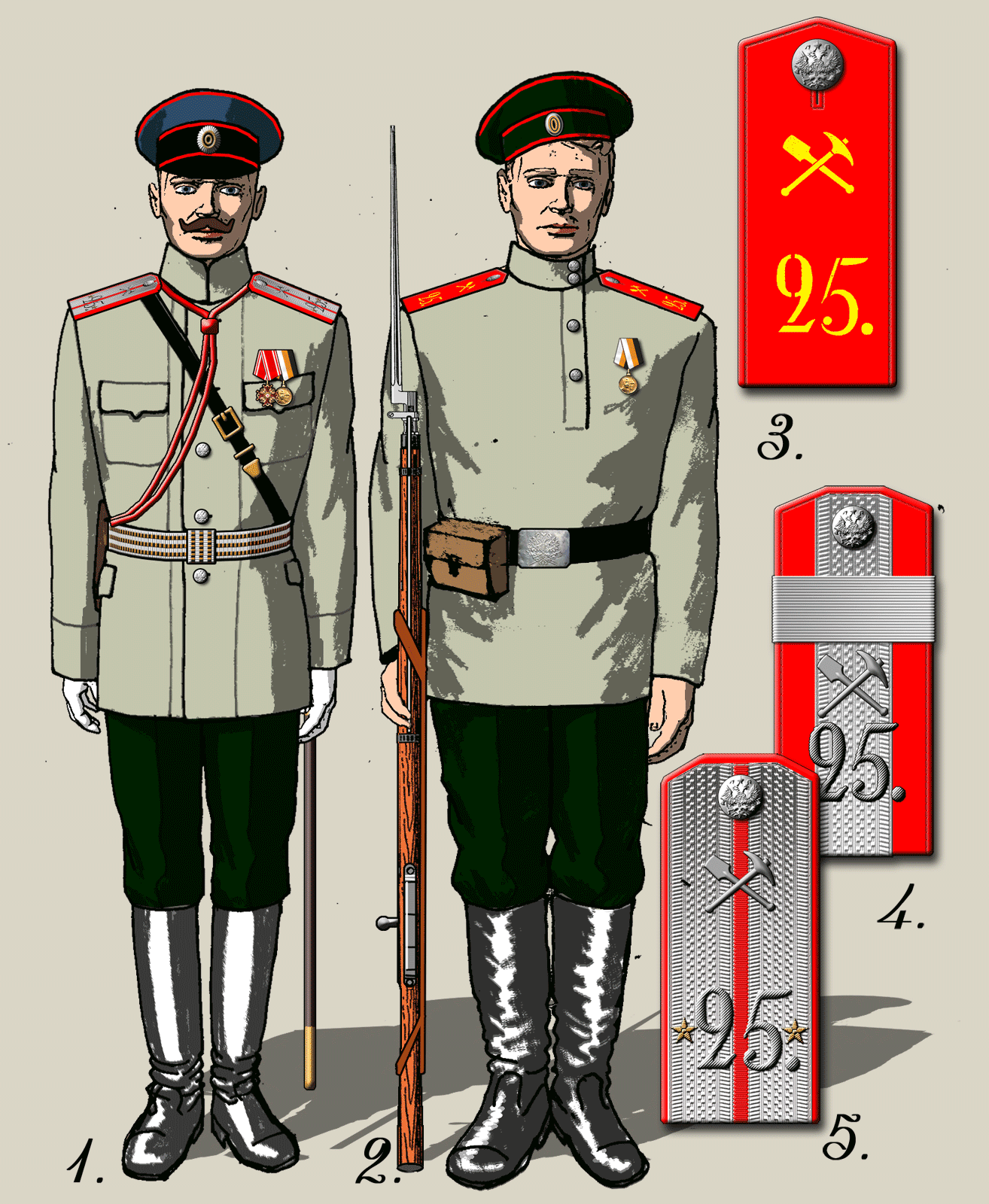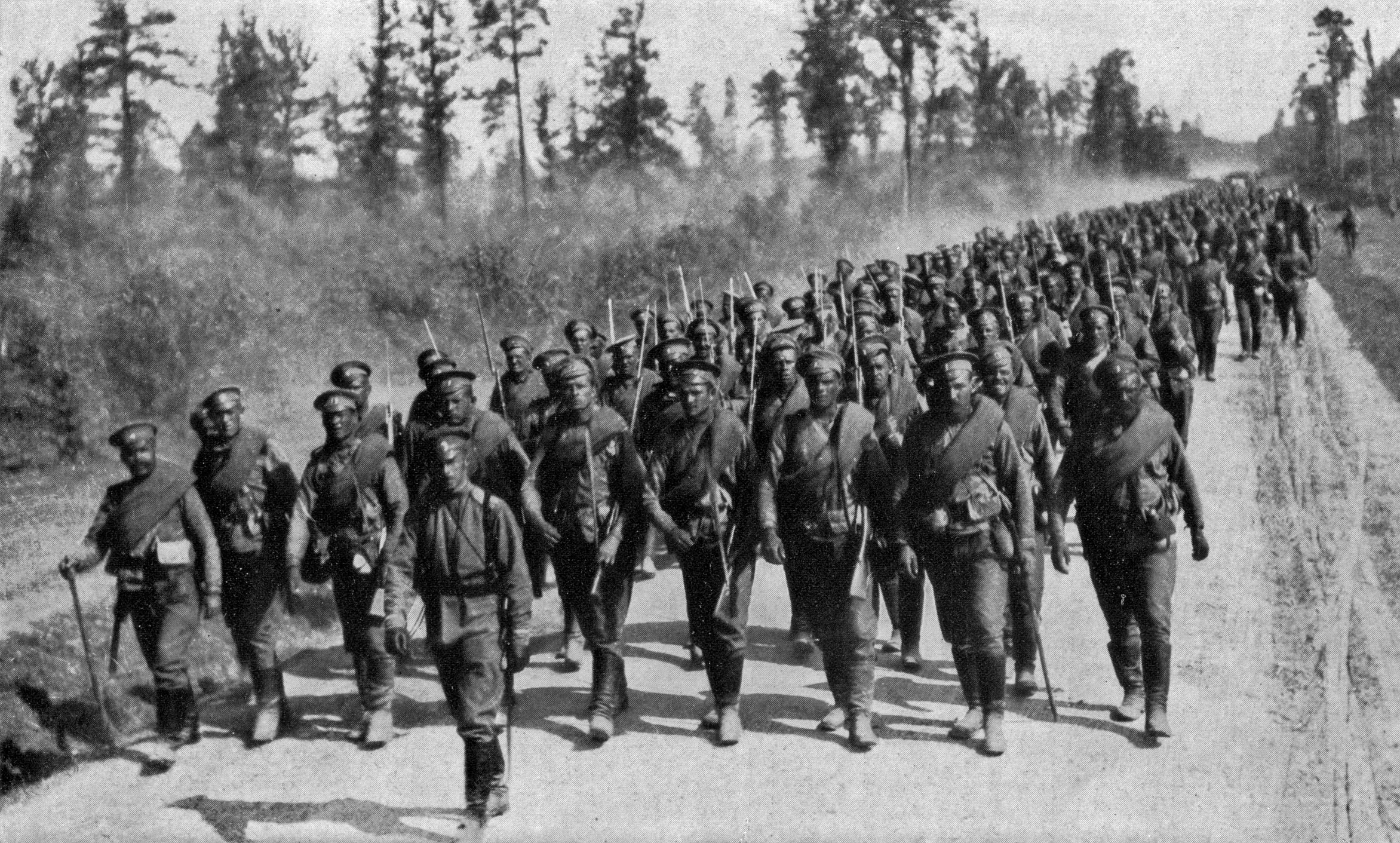|
Alexander Ragoza
Alexander Frantsevich Ragoza (; 20 June [O.S. 8 June] 1858 – 29 June 1919), also known as Oleksandr Frantsevych Rohoza (), was a Russian Empire, Russian General of the Infantry (Imperial Russia), general of the infantry during World War I, and Minister of Defense of the Ukrainian State. Biography Born on 20 June (Old Style and New Style dates, O.S. 8 June) 1858 in Vitebsk Governorate, Ragoza was the eldest son of Franz Martynovich Ragosa, a military officer from the governorate's hereditary nobility. Following the example of his father, he chose a military career and entered the Polotsk military Gymnasium (school), gymnasium, continuing his education at the Mikhailovsky Artillery School after 1874. Posted to the 3rd Guards Grenadier Artillery Brigade immediately after completing his studies, Ragoza received his baptism of fire immediately after graduation at the front during the Russo-Turkish War (1877–1878), Russo-Turkish War of 1877-1878. On account of his bravery in com ... [...More Info...] [...Related Items...] OR: [Wikipedia] [Google] [Baidu] |
Ukrainian State
The Ukrainian State (), sometimes also called the Second Cossack Hetmanate, Hetmanate (), was an Anti-communism, anti-Bolshevik government that existed on most of the modern territory of Ukraine (except for Western Ukraine) from 29 April to 14 December 1918. It was installed by German Empire, German military authorities after the socialist-leaning Central Council of Ukraine, Central Council of the Ukrainian People's Republic was dispersed on 28 April 1918. The Ukrainian State was governed by Pavlo Skoropadskyi, the hetman of all Ukraine, who outlawed all socialist-oriented political parties, creating an Anti-communism, anti-Bolshevik front with the Russian State. It collapsed in December 1918, when Skoropadskyi was deposed and the Ukrainian People's Republic returned to power in the form of the Directorate of Ukraine, Directorate. History Background As a result of the Bolshevik aggression, the government of the Ukrainian People's Republic that initially pursued anti-m ... [...More Info...] [...Related Items...] OR: [Wikipedia] [Google] [Baidu] |
25th Army Corps (Russian Empire)
The 25th Army Corps was an Army corps in the Imperial Russian Army. Composition * 3rd Grenadier Division * 46th Infantry Division Part of * 5th Army: 1914 * 9th Army: 1914 - 1915 * 4th Army: 1915 * 3rd Army: 1915 - 1916 *4th Army: 1916 * 2nd Army: 1916 * Russian Special Army: 1916 - 1917 * 11th Army: 1917 Commanders *1910-1914: Dmitry Zuyev *1914-1915: Alexander Ragoza Alexander Frantsevich Ragoza (; 20 June .S. 8 June1858 – 29 June 1919), also known as Oleksandr Frantsevych Rohoza (), was a Russian Empire, Russian General of the Infantry (Imperial Russia), general of the infantry during World War I, a ... *1915-1916: Yuri Danilov *1916-1917: Lavr Kornilov References * {{Russian Empire Ground Forces Corps of the Russian Empire ... [...More Info...] [...Related Items...] OR: [Wikipedia] [Google] [Baidu] |
Order Of Saint Anna Ribbon Bar
Order, ORDER or Orders may refer to: * A socio-political or established or existing order, e.g. World order, Ancien Regime, Pax Britannica * Categorization, the process in which ideas and objects are recognized, differentiated, and understood * Heterarchy, a system of organization wherein the elements have the potential to be ranked a number of different ways * Hierarchy, an arrangement of items that are represented as being "above", "below", or "at the same level as" one another * an action or inaction that must be obeyed, mandated by someone in authority People * Orders (surname) Arts, entertainment, and media * ''Order'' (film), a 2005 Russian film * ''Order'' (album), a 2009 album by Maroon * "Order", a 2016 song from '' Brand New Maid'' by Band-Maid * ''Orders'' (1974 film), a film by Michel Brault * "Orders" (''Star Wars: The Clone Wars'') Business * Blanket order, a purchase order to allow multiple delivery dates over a period of time * Money order or postal order, a ... [...More Info...] [...Related Items...] OR: [Wikipedia] [Google] [Baidu] |
Russian Civil War
The Russian Civil War () was a multi-party civil war in the former Russian Empire sparked by the 1917 overthrowing of the Russian Provisional Government in the October Revolution, as many factions vied to determine Russia's political future. It resulted in the formation of the Russian Soviet Federative Socialist Republic, Russian Socialist Federative Soviet Republic and later the Soviet Union in most of its territory. Its finale marked the end of the Russian Revolution, which was one of the key events of the 20th century. The List of Russian monarchs, Russian monarchy ended with the abdication of Nicholas II, Tsar Nicholas II during the February Revolution, and Russia was in a state of political flux. A tense summer culminated in the October Revolution, where the Bolsheviks overthrew the Russian Provisional Government, provisional government of the new Russian Republic. Bolshevik seizure of power was not universally accepted, and the country descended into a conflict which beca ... [...More Info...] [...Related Items...] OR: [Wikipedia] [Google] [Baidu] |
Battle Of Mărășești
The Battle of Mărășești (6 August 1917 – 3 September 1917) was the last major battle fought by the Central Powers against the Kingdom of Romania and Russian Empire, Russia on the Romania in World War I, Romanian front during World War I. Romania was mostly occupied by the Central Powers, but the Battle of Mărășești kept the northern region of the country free from occupation. Background Mărășești, just like Mărăști, Vrancea, Mărăști, is part of the strategically important area of the Focșani Gate. Control of this area eases attacks into several Romanian regions. On 22 July 1917, the Romanians launched a Kerensky Offensive, joint offensive with Russian Republic, Russia against the Austria-Hungary, Austro-Hungarian 1st Army, around Mărăști and the lower part of the Siret River, Siret river, which resulted in the Battle of Mărăști. Although there was some initial success, a counter-offensive by the Central Powers in Kingdom of Galicia and Lodomeria, Gali ... [...More Info...] [...Related Items...] OR: [Wikipedia] [Google] [Baidu] |
Romania In World War I
The Kingdom of Romania was neutral for the first two years of World War I, entering on the side of the Allies of World War I, Allied powers from 27 August 1916 until Central Powers, Central Power occupation led to the Treaty of Bucharest (1918), Treaty of Bucharest in May 1918, before reentering the war on 10 November 1918. It had the most significant oil fields in Europe, and German Empire, Germany eagerly bought its petroleum, as well as food exports. From the point of view of its belligerent status, Romania was a neutral country between 28 July 1914 and 27 August 1916, a belligerent country on the part of the Allies of World War I, Entente from 27 August 1916 to 9 December 1917, in a state of armistice with the Central Powers from 10 December 1917 to 7 May 1918, a non-combatant country between 7 May 1918 and 10 November 1918, and finally a belligerent country in the Entente between 10 and 11 November 1918. At the start of World War I, King of Romania, King Carol I of Romania f ... [...More Info...] [...Related Items...] OR: [Wikipedia] [Google] [Baidu] |
Eastern Front (World War I)
The Eastern Front or Eastern Theater, of World War I, was a theater (warfare), theater of operations that encompassed at its greatest extent the entire frontier between Russian Empire, Russia and Kingdom of Romania, Romania on one side and Austria-Hungary, Kingdom of Bulgaria, Bulgaria, the Ottoman Empire, and German Empire, Germany on the other. It ranged from the Baltic Sea in the north to the Black Sea in the south, involved most of Eastern Europe, and stretched deep into Central Europe. The term contrasts with the Western Front (World War I), Western Front, which was being fought in Belgium and French Third Republic, France. Unlike the static warfare on the Western Front, the fighting on the geographically larger Eastern Front was maneuver warfare, more dynamic, often involving the flanking and encirclement of entire formations, and resulted in over 100,000 square miles of territory becoming occupied by a foreign power. At the start of the war Russia launched offensives agai ... [...More Info...] [...Related Items...] OR: [Wikipedia] [Google] [Baidu] |
World War I
World War I or the First World War (28 July 1914 – 11 November 1918), also known as the Great War, was a World war, global conflict between two coalitions: the Allies of World War I, Allies (or Entente) and the Central Powers. Fighting took place mainly in European theatre of World War I, Europe and the Middle Eastern theatre of World War I, Middle East, as well as in parts of African theatre of World War I, Africa and the Asian and Pacific theatre of World War I, Asia-Pacific, and in Europe was characterised by trench warfare; the widespread use of Artillery of World War I, artillery, machine guns, and Chemical weapons in World War I, chemical weapons (gas); and the introductions of Tanks in World War I, tanks and Aviation in World War I, aircraft. World War I was one of the List of wars by death toll, deadliest conflicts in history, resulting in an estimated World War I casualties, 10 million military dead and more than 20 million wounded, plus some 10 million civilian de ... [...More Info...] [...Related Items...] OR: [Wikipedia] [Google] [Baidu] |
Russo-Turkish War (1877–1878)
The Russo-Turkish War (1877–1878) was a conflict between the Ottoman Empire and a coalition led by the Russian Empire which included United Principalities of Moldavia and Wallachia, Romania, Principality of Serbia, Serbia, and Principality of Montenegro, Montenegro. Precipitating factors included the Russian goals of recovering territorial losses endured during the Crimean War of 1853–1856, re-establishing itself in the Black Sea and supporting the political movement attempting to free Balkan nations from the Ottoman Empire. The Romanian army had around 114,000 soldiers in the war. In Romania the war is called the Russo-Romanian-Turkish War (1877–1878) or the Romanian War of Independence, Romanian War of Independence (1877–1878). The Russian-led coalition won the war, pushing the Ottomans back all the way to the gates of Constantinople, leading to the intervention of the Western European great powers. As a result, Russia succeeded in claiming provinces in the Caucasus, n ... [...More Info...] [...Related Items...] OR: [Wikipedia] [Google] [Baidu] |
4th Ukrainian Army , or The Fourth of July
{{Disambiguation ...
Fourth or the fourth may refer to: * the ordinal form of the number 4 * ''Fourth'' (album), by Soft Machine, 1971 * Fourth (angle), an ancient astronomical subdivision * Fourth (music), a musical interval * ''The Fourth'', a 1972 Soviet drama See also * * * 1/4 (other) * 4 (other) * The fourth part of the world (other) * Forth (other) * Quarter (other) * Independence Day (United States) Independence Day, known colloquially as the Fourth of July, is a federal holiday in the United States which commemorates the ratification of the Declaration of Independence by the Second Continental Congress on July 4, 1776, establishing ... [...More Info...] [...Related Items...] OR: [Wikipedia] [Google] [Baidu] |



